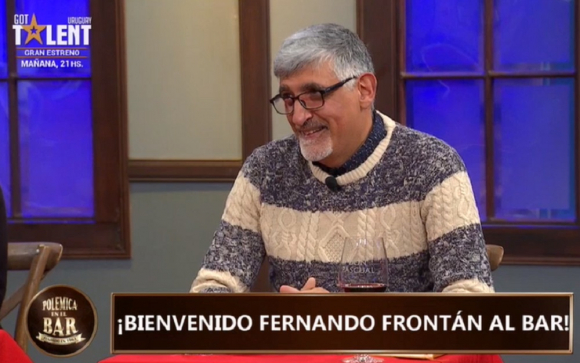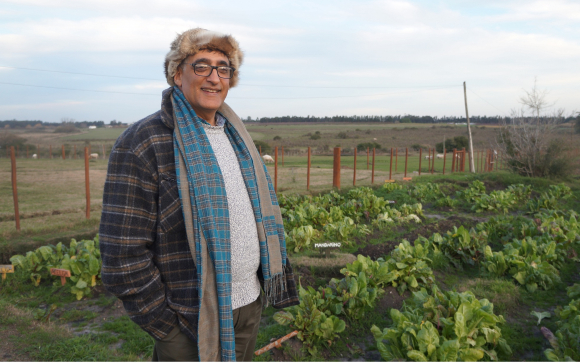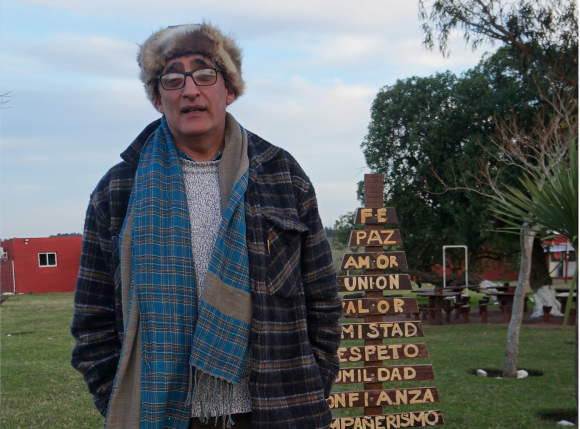This content is exclusive to our subscribers.
It has been 25 years since he arrived on television at the hands of The watch first and open discussion after. It was also part of the cycle this mouth is mine, although his work with young addicts and in a critical context took him away from the screen. Last week he returned to Channel 10 to join the panel of Controversy at the bar where he said, because of his television background, to feel at home; he will have, due to his responsibilities, an itinerant participation. In this interview with Saturday Show, Fernando Frontan talks about his career as a panelist, his social activity, the price he had to pay for being a pioneer in the way of representing diversity on Uruguayan television, and also analyzes the controversy that broke out between Sergio Puglia and Julio Ríos on the program which today integrates.
—How does it feel to join Controversy in the bar? Did you watch the program?
—I’m not watching much Uruguayan television. From time to time I get hooked on talk shows because I like them so much, so Bar Smack at some point I watched it. I did know the people who were working there because last year they had invited me for a particular topic and I participated.
—It’s like going back to your origins with Open Discussion.
—Yes, this year marked the 25th anniversary of my first appearance on television in Open Debate and this mouth is mine after. Always on topics of debates and controversies, then the format of Controversy in the bar, as a talk show, is not foreign to me. It has its format peculiarities, but a much more relaxed dynamic that enables that experience of debating on the show, or making a show of the debate.

—Exchange ideas in the middle of the show.
—When I say “show” I am not making a disparaging assessment. Television is entertainment and if it wasn’t entertaining, it wouldn’t be attractive. What yes, obviously, there are topics that in this case have a social purpose and the program can put a topic on the table, discuss it, see the different edges and problems. It is not the program’s business to resolve the issue, it is to see the different perspectives that it has and listen to the voices, establish dialogues. Some are more heated than others and therein lies the most social function of the program, which is to show that it is possible to dialogue, beyond differences, adversities and antagonistic positions. Dialogue is a cultural principle that makes the agreement of a society, and one that does not have the capacity to dialogue does not have the capacity to negotiate and therefore to coexist. In other words, dialogue and social coexistence need each other. In that sense I feel that I have things to contribute and years of experience in debates.
—When did they call you to join the program?
—Last year they called me for a program and asked me if I was willing to return, but formally it was at the beginning of last week. The idea of being an itinerant panelist seemed barbaric to me because my daily activities would not enable me to do anything other than what was proposed to me, so I did not resist much to accept, apart from the fact that I like television, debate and I know how to do it. Everything is combined so that the decision is happy. On Sunday when I formally arrived as part of the program they asked me and I said it was like coming home. I began my walk on television on Channel 10 at a very particular moment.
-Prior to open discussion you had been in The watch.
—Yes, with Ángel María Luna. At that time the panel of open discussion which began the following year, in May 1998, and from the outset I sat on that program until the end of 2002 when the cycle ended.

—In those years it was not common for there to be an openly homosexual person on television talking about social issues.
-What happens is that the homosexuals who had been until then were in comedy shows, from the ridiculous place where they did not compromise anyone, and coincidentally the social activism that I had been doing in the LGBTIQ community in Uruguay put me on a trampoline that it was significant for me personally and for the group, being able to be in a place at parity level. The groups are part of society, although at that time we were second-class citizens. We were able to begin to make a trajectory to be first class citizens. We are not in total quality or quality but we advanced a lot and that visibility served for it. At that moment I knew that it was a great opportunity and that my duty was to take advantage of it. I looked for a lot of support from selfless and intelligent people who helped me think and understand the language of the historical moment that I was living. An openly gay man on television caused many people discomfort because he was outside the stereotype of the effeminate, queer, crazy, hysterical, which was what was reproduced in comedy shows. But the channel opted for me, but also for the challenges of the time that were coming.
—In those early years you had to debate with Julio Toyos and Pablo Vierci, for example. How do you remember those times?
“That triad was spectacular. Toyos was a man from the university of the street, as he said, bowling and soccer. On the other hand, an intellectual like Vierci who came from the academic world was more thoughtful, and in between me, a gay activist. There were also outstanding women such as Ligia Almitrán, Cristina Maeso, Selva Andreoli, Pelusa Vidal. The role of women was much more unified. It was possible that at that time it was a more patriarchal program, because the three men fought and it had an impact on the program and the population.

—Did you feel that at some point you marked the agenda in social issues or in the LGBTIQ community?
—I don’t know if I felt it, I had the purpose of doing it and I think I generated an incident. The topic was raised and I think there was an echo. I also think it was the moment, because sometimes you have to have a sense of opportunity and that was the moment. I don’t know if I did it well overall, but it worked and important changes were generated. We put on the population’s agenda that diverse people, sexually, are not different from others, and a door was opened for society to be more receptive to these issues. I’m not going to say that what came after is under the shadow of my performance, but much of what came had to do with that incidence.
—Did you have to pay a cost in your work outside of television, for your visibility?
—At that time I worked in the banking cooperative, in the credit department with the public, and a few days later they changed me. They didn’t fire me, but they changed my position. I went to work in the administration of gastronomy, from half past five in the morning until after noon, when the cooperative opened in the afternoon. Many people did not make themselves visible because if they did, it was such a challenge that you could lose your job. They were not easy years. I took the risk and paid the price. We were winning battles, but there is still discrimination. There is still a phobia of what is different, what is new. Societies and history move in a pendulum dynamic, passing through different strata, and one discrimination that has been overcome gives rise to another. In reality, there is a system behind it that has a hegemonic ideology and that system reproduces itself. It does not change. We have had problems facing the patriarchy.
—Have you seen this type of approach on television?
-In Controversy at the bar there was an approach about soccer and Julio Ríos calls Sergio Puglia “Mirtha Legrand del Uruguay”. He reacts as men react in this macho society: “You don’t treat me like a woman” and I don’t know how much. One threw the vegetables at him as if to wet his ear, the other reacts by confirming the macho issue. I am not making an ethical judgment, I am making a symbolic reading. I watched that program and the question I asked myself was: is a woman synonymous with offense? Can I use it as an insult, as something demeaning? Puglia replies: “I am Sergio Puglia”, as if to say “I am a man, I belong to the patriarchy and machismo”.
“What would you have said?”
—I would have asked that question: is being a woman an offense? Perhaps women continue to represent a challenge to the power that has been concentrated in men, ergo machismo, patriarchy, that this ideological structure is not willing to lose and defends itself. Perhaps not from conscious spaces, but it continues to exist. And as long as those ideological patterns continue ahead, that are not questioned, destroyed, we will continue to have inequalities between men and women and between everything different from the macho structure that is put forward.
—You work on spirituality in critical contexts of society and with addicts. What has that social work taught you?
—If anyone has taught me that you can live and change, it’s addicted people. I have learned to trust them and their processes. And society is also part of this addictive dynamic, dependent on and excluding human dignity. So, integrity is that space or value that seeks to unite dignity with exclusion. We are complete when we manage to integrate what is excluded from dignity.
Fernando Frontán: “An openly gay man on TV caused a lot of people discomfort”
